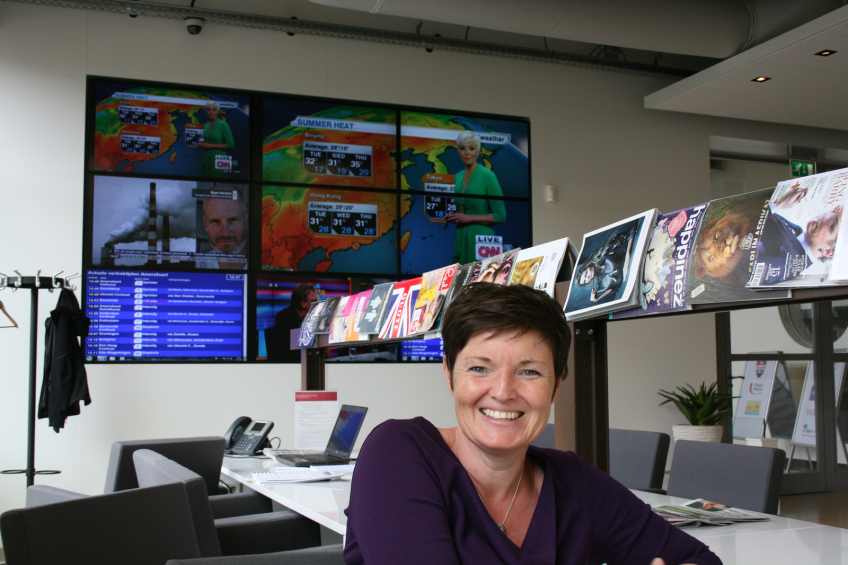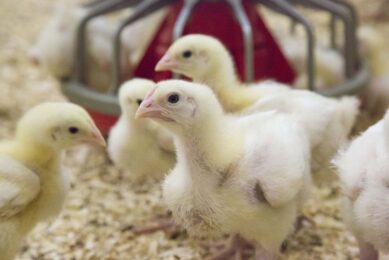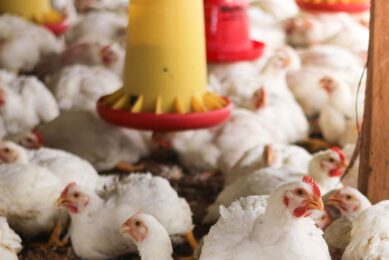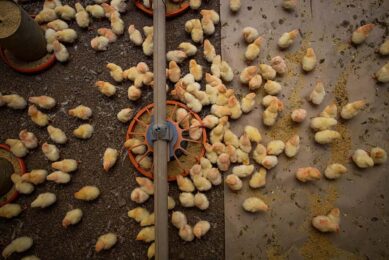‘Bridging Sino-Dutch business’

The vast size of China and it’s enormous hunger for food makes it a country with great potential for agrifood companies. However, entering the Chinese market and doing business successfully, is not that easy. Ina Enting of Dutch Meat & Feed Centre helps companies not to get lost in China and brands Dutch knowledge and quality via the Orange Pig and Orange Poultry clusters.
By Fabian Brockötter
More than 30,000 Chinese farmers and people from the agricultural sector attended the China Animal Husbandry Expo (CAHE) organised by the China Agriculture Association (CAA). On 100,000 square meters of exhibition space, some 1,500 companies presented their business. At centre stage, not to be missed by anyone, Dutch companies represented themselves collectively at the Holland Pavilion. “Together you have a stronger presence, together you can show the world what Holland has to offer,” says Ina Enting. A combined effort to show the Chinese what Holland has to offer and where the Dutch can help Chinese agriculture to move to the next level, gave exposure where the companies were looking for it. “That said, you have to keep in mind that the image you have is not what you send out, it is how you are perceived.”
Q What is the main objective of Orange Pig and Orange Poultry?
“The clusters are the entry hub for the Chinese government and Chinese investors in the agricultural sector. They are the bridge between what China asks for and what Holland has to offer, pointing both sides in the right direction. With a permanent representation in China we can liaise at an overarching level, before connecting the right partners at an individual level. We are not pushing our merchandise toward China while flying in once a year hoping to fill the order books, we show what we are good at and fill in the demand that Chinese ask us to fill in on a permanent basis.”
Q Within the platforms there are some well experienced companies like Nedap, Nutreco and Fancom active. Aren’t they skilled enough to work the market themselves?
“Of course they are, and they do. However, many opportunities lie in investment which transcend the scope of an individual firm. When it comes to developing the whole pig and/or poultry sector in China the government isn’t doing business with individual firms. They want to follow a more holistic approach, tackling more issues at the same time.
With the combined knowledge of all involved in the ‘Orange’ platforms, we can cater to those needs.”
Q China is a huge country with even bigger demands, is that something which Dutch firms can cope with?
“The sheer size is more of an opportunity than a problem in itself.
The key advise for all companies entering the Chinese market is to have focus, otherwise they will drown in the opportunities presented to them.
A clear strategy and holding on to that plan is the most important thing, even when 1,000 ideas will be brought to you. China is a place where staggering numbers will tempt almost every
entrepreneur.
One has to take into account that the growth projections and plans do not guarantee instant results. In some parts of the market there is overcapacity already and a lot of projects are cash driven, not yield driven.
Meaning; when the money runs out, the project comes to a sudden halt for an indefinite period of time. That is where a lot of foreign companies go over the deep end.”
Q Why are Dutch and other foreign firms targeting China in the first place?
“Business opportunities for one. But there is another reason as well. The market that most companies focus on in Europe is saturated. If they want to create financial room for research and development, the have to venture out into the world to increase their margin. Only by selling quantity are the companies able to further develop the newest technologies to test and roll out on their home markets.
That said, our experience teaches us that costs come before the results. Companies who want to make a quick buck in China, we cannot help. It will take at least 3-5 years of investing in relations, time and money, before the returns come in.”
Q And what about the Chinese manner of doing business?
“Business in China is 99.9% about building relationships. The Chinese as well as the Dutch have a trading mentality, but the Dutch are far too direct in their negotiations for the Chinese to feel comfortable with.
On the other hand, when the Chinese have signed a contract including an agreement on a set price, for them the price negotiations start all over again. The Dutch are used to holding on to the set price.”
Q Is China the land of the
unlimited opportunities?
“Yes and no. Livestock production in China cannot expand without any restrictions. The Chinese government tends to look at least ten years ahead, identifying possibilities and problems. Pollution of air, ground and especially water due to washout of chemicals and fertilisers will hinder growth.
Also issues like NH3 emissions from livestock production into the air are or will be on the agenda.
The same goes for the use of antibiotics and the issue of quality management in production after the scandal of the ‘instant chicken’.
Unrestricted growth will not take place, but helping the Chinese cope with problems which have been on the agenda in Europe for years, is something we are good at.”
Profile
Ina Enting is managing director of the Dutch Meat & Feed Centre, located in Beijing City, China. The Dutch Meat & Feed Centre (DMFC) is an international agribusiness support office, it’s mission is bridging Sino-Dutch business. It helps clients enter and expand in the Chinese market successfully, combining knowledge of Dutch business demands and local Chinese knowledge of the market. Ina Enting has a background in agricultural research, feed and veterinary medicine and is involved in marketing Dutch business in China for more than five years now. Currently she is a co-ordinator of the Orange Pig and Orange Poultry clusters.
[Source: World Poultry magazine Vol 30 nr 6, 2014]
Join 31,000+ subscribers
Subscribe to our newsletter to stay updated about all the need-to-know content in the poultry sector, three times a week. Beheer
Beheer








 WP Admin
WP Admin  Bewerk bericht
Bewerk bericht